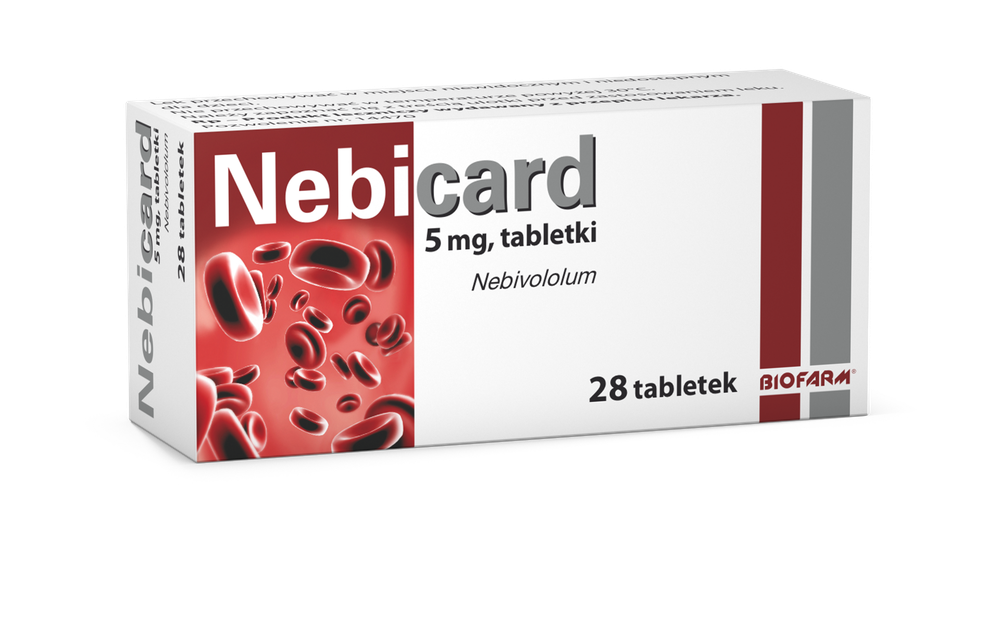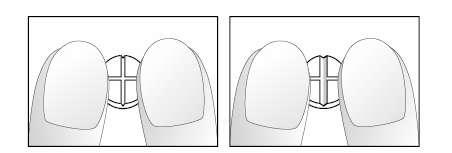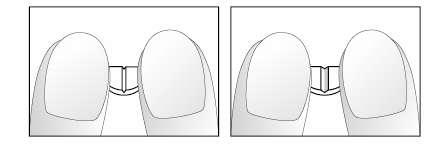

Nebicard

Ask a doctor about a prescription for Nebicard

How to use Nebicard
Package Leaflet: Information for the User
Nebicard
5 mg, tablets
Nebivolol
Read the package leaflet carefully before taking the medicine, as it contains important information for the patient.
- Keep this package leaflet, you may need to read it again.
- If you have any further questions, ask your doctor or pharmacist.
- This medicine has been prescribed for you only. Do not pass it on to others. It may harm them, even if their symptoms are the same as yours.
- If you experience any side effects, including those not listed in this package leaflet, please inform your doctor or pharmacist. See section 4.
Contents of the Package Leaflet
- 1. What is Nebicard and what is it used for
- 2. Important information before taking Nebicard
- 3. How to take Nebicard
- 4. Possible side effects
- 5. How to store Nebicard
- 6. Contents of the pack and other information
1. What is Nebicard and what is it used for
Nebicard contains nebivolol, which is a selective beta-adrenergic receptor blocker with vasodilating properties. This medicine is used to treat high blood pressure (hypertension).
Nebicard is also used to treat chronic heart failure in patients aged 70 years or older.
Nebicard may also be used to treat symptomatic stable angina pectoris.
2. Important information before taking Nebicard
When not to take Nebicard
- if you are allergic to nebivolol or any of the other ingredients of this medicine (listed in section 6),
- in case of low blood pressure (systolic blood pressure or "upper" blood pressure is less than 90 mmHg),
- in case of poor blood circulation in the limbs,
- in case of very slow heart rate (less than 60 beats per minute before starting treatment with this medicine),
- if you have been diagnosed with conduction disorders in the heart (such as sick sinus syndrome or atrioventricular block) and you do not have a pacemaker,
- in case of acute heart failure or intravenous treatment (through a drip) to support heart function,
- in case of breathing difficulties or wheezing (currently or in the past),
- if you have a phaeochromocytoma (a rare tumor of the adrenal gland),
- if you have severe liver disease or liver function disorders,
- in case of metabolic acidosis (as in diabetic patients when blood glucose levels become too high and the blood becomes too acidic),
- if you are taking medicines containing floctafenine or sultopride.
Warnings and precautions
Before starting treatment with Nebicard, you should discuss it with your doctor – if you have or develop any of the following conditions:
- heart failure (the heart's inability to pump enough blood to meet the body's needs),
- mild (first-degree) atrioventricular block in the heart,
- chest pain caused by coronary artery spasm (Prinzmetal's angina),
- poor circulation in the limbs, such as Raynaud's disease or syndrome, or muscle cramps when walking,
- long-term breathing problems,
- diabetes: Nebicard does not affect blood glucose levels, but it may mask the symptoms of low blood glucose levels (hypoglycemia) and may increase the risk of severe hypoglycemia when used with certain types of oral antidiabetic medicines called sulfonylureas (such as gliclazide, glibenclamide, glipizide, gliburide, or tolbutamide),
- hyperthyroidism, as Nebicard may mask the symptoms of abnormal heart rate in this condition,
- allergy, as allergic reactions may be more severe and may require more medication to treat them,
- skin changes known as psoriasis, as Nebicard may worsen symptoms,
- wearing contact lenses, as Nebicard may reduce tear production and cause dry eyes.
In such cases, your doctor may adjust the treatment or monitor you more closely.
In case of planned surgery and the need for anesthesia, it is essential to inform the surgeon or dentist that you are taking this medicine.
In case of kidney function disorders, you should not take this medicine to treat heart failure. You should inform your doctor about this.
Children and adolescents
Due to the lack of data on the use of the medicine in children and adolescents, it is not recommendedto use Nebicard in this patient group.
Nebicard and other medicines
You should tell your doctor or pharmacist about all medicines you are taking now or have taken recently, as well as any medicines you plan to take, including those that are available without a prescription, herbal preparations, vitamins, and minerals in large doses. Some medicines should not be taken at the same time, while others may require specific changes (e.g., dose changes).
You should always inform your doctor or pharmacist if you are taking any of the following medicines at the same time as Nebicard:
- diltiazem or verapamil (used to treat high blood pressure or other heart disorders); during treatment with Nebicard, verapamil should not be administered intravenously,
- medicines belonging to calcium channel blockers, used to treat high blood pressure or other heart disorders, such as amlodipine, felodipine, lacidipine, nifedipine, nicardipine, nimodipine, nitrendipine,
- other antihypertensive medicines or organic nitrates used to treat chest pain,
- clonidine, guanfacine, moxonidine, methyldopa, rilmenidine used to treat high blood pressure,
- medicines used to treat heart rhythm disorders (irregular heartbeat), such as quinidine, hydroquinidine, amiodarone, cybenzoline, flecainide, disopyramide, lidocaine, mexiletine, propafenone,
- tricyclic antidepressants (used to treat depression), phenothiazines (used to treat psychosis), or barbiturates (used to treat epilepsy),
- medicines used to treat diabetes (insulins and oral antidiabetic medicines),
- digoxin or other digitalis glycosides (used to treat heart failure),
- non-steroidal anti-inflammatory medicines (NSAIDs) used to treat pain and inflammation - note that small daily doses of acetylsalicylic acid (e.g., 50 mg or 100 mg) used to reduce blood clotting can be safely taken with Nebicard,
- medicines used to treat asthma, nasal congestion, or certain eye disorders, such as glaucoma (increased eye pressure) or pupil dilation,
- anesthetics: you should always inform the anesthesiologist about taking Nebicard before undergoing anesthesia,
- cimetidine (used to treat excess stomach acid) - Nebicard should be taken during meals, and antacids between meals,
- medicines that affect nebivolol metabolism, i.e., terbinafine (used to treat fungal or yeast infections), bupropion (used to help quit smoking), chloroquine (used to treat malaria or rheumatoid arthritis), levomepromazine (used to treat psychosis), paroxetine, fluoxetine, thioridazine (used to treat depression),
- amifostine (a protective medicine used during chemotherapy or radiotherapy),
- baclofen (a muscle relaxant),
- mefloquine (an antimalarial medicine),
- diabetes medicines, such as insulin or oral antidiabetic medicines.
Nebicard with food and drink
Nebicard can be taken before, during, or after meals, and can also be taken without food.
The tablet or its parts should be swallowed with water or another liquid.
Pregnancy and breastfeeding
If you are pregnant or breastfeeding, think you may be pregnant, or plan to have a child, you should consult your doctor or pharmacist before taking this medicine.
Pregnancy
Nebicard should not be used during pregnancy, unless your doctor has decided otherwise.
Breastfeeding
Nebicard is not recommended during breastfeeding.
Driving and using machines
No studies have been conducted on the effect on the ability to drive and use machines. The medicine may cause dizziness or fatigue. If such symptoms occur, you should not drive or operate machines. The occurrence of these symptoms is more likely at the beginning of treatment or after increasing the dose (see also section 4).
Nebicard contains lactose.
If you have been diagnosed with intolerance to some sugars, you should contact your doctor before taking this medicine.
3. How to take Nebicard
This medicine should always be taken exactly as advised by your doctor. If you are unsure, consult your doctor or pharmacist.
Treatment of high blood pressure (hypertension)
- The usual dose is 1 tablet per day.
- For elderly patients and patients with kidney function disorders, the initial dose is usually 1/2 tablet per day.
- It may take up to 4 weeks for the medicine to start working fully.
Treatment of chronic heart failure
- Treatment will be initiated and monitored by an experienced doctor.
- Treatment starts with an initial dose of 1/4 tablet per day. This dose may be increased after 1-2 weeks to 1/2 tablet per day, then to 1 tablet per day, and then to 2 tablets per day, until the optimal dose for the patient is reached.
- The maximum recommended dose is 10 mg (2 tablets per day).
- The patient will require observation by an experienced doctor for 2 hours after starting treatment and each time the dose is increased.
- Depending on the need, the doctor may reduce the dose of the medicine; it should not be stopped abruptly, as this may worsen heart failure.
- Patients with severe kidney function disorders should not take this medicine.
Treatment of symptomatic stable angina pectoris
- Treatment will be initiated and monitored by an experienced doctor.
- Treatment starts with an initial dose of 1/4 tablet per day (1.25 mg). This dose may be increased depending on the tolerance of the medicine after 1-2 weeks to 1/2 tablet (2.5 mg) per day, then to 1 tablet (5 mg) per day, and then to 2 tablets (10 mg) per day, until the optimal dose for the patient is reached.
- The maximum recommended dose is 10 mg (2 tablets per day).
Your doctor may decide to use Nebicard tablets in combination with another medicine indicated for the patient.
Use in children and adolescents
Nebicard is not recommended for use in children and adolescents.
Method of administration
The medicine should be taken once a day, preferably at the same time every day.
The tablet can be divided into four equal parts.
If your doctor has prescribed ¼ (a quarter) or ½ (half) a tablet per day, you should follow the instructions below on how to divide Nebicard 5 mg tablets with cross-breaking notches:
- Place the tablet on a flat, hard surface (e.g., a table or countertop) with the cross-breaking notches facing up.
- Break the tablet by pressing your index fingers on both hands along one of the breaking notches (Figure 1 and 2).
- To obtain quarters, break the halves of the tablet in the same way (Figure 3 and 4).

Figure 1 and 2: Easy way to break a Nebicard 5 mg tablet with cross-breaking notches into halves.

Figure 3 and 4: Easy way to break a half of a Nebicard 5 mg tablet with cross-breaking notches into quarters.
Overdose of Nebicard
In case of accidental ingestion of too many tablets (overdose), the patient may experience: slow heart rate, low blood pressure, and other heart disorders, breathing difficulties or wheezing. You should immediatelycontact the nearest hospital or inform your doctor or pharmacist.
Missed dose of Nebicard
If you forget to take a dose of Nebicard, but remember soon after, you should take the dose as usual. However, if a long time has passed (e.g., several hours or a whole day) and it is almost time for the next dose, you should skip the missed dose and take the next planned dose at the usual time.
You should not take a double dose to make up for the missed dose.
You should avoid repeatedly missing doses.
Stopping treatment with Nebicard
You should not stop taking Nebicard without consulting your doctor first. Abrupt withdrawal of the medicine may cause dangerous worsening of symptoms in the patient. This applies especially to patients with angina pectoris.
If you have any further questions about taking this medicine, you should consult your doctor or pharmacist.
4. Possible side effects
Like all medicines, Nebicard can cause side effects, although not everybody gets them.
When Nebicard is used to treat high blood pressure, the following side effects may occur:
Common side effects (occurring in less than 1 in 10 people, but more than 1 in 100):
- headache
- dizziness
- fatigue
- abnormal itching or tingling sensation
- diarrhea
- constipation
- nausea
- shortness of breath
- swelling of hands or feet
Uncommon side effects (occurring in less than 1 in 100 people, but more than 1 in 1,000):
- slow heart rate or other heart disorders
- low blood pressure
- leg cramps when walking
- abnormal vision
- impotence (difficulty achieving an erection)
- depressive feelings
- digestive disorders (indigestion), gas in the stomach or intestines
- vomiting
- skin rash, itching
- shortness of breath, such as in asthma, due to sudden constriction of the airway muscles (bronchospasm)
- nightmares
Rare side effects (occurring in less than 1 in 10,000 people):
- fainting
- worsening of psoriasis (a skin disease with scaly, pink patches)
Frequency not known (cannot be estimated from the available data):
- systemic allergic reactions with generalized skin rashes (hypersensitivity reactions)
- angioedema: sudden swelling of the skin of the face or limbs, lips, tongue, mucous membranes of the throat and airways, causing shortness of breath or difficulty swallowing
- you should contact your doctor immediately!
- hives
In clinical trials for chronic heart failure, the following side effects were observed:
Very common side effects (occurring in more than 1 in 10 people):
- slow heart rate
- dizziness
Common side effects (occurring in less than 1 in 10 people, but more than 1 in 100):
- worsening of heart failure
- low blood pressure (manifested as a feeling of weakness when standing up quickly)
- intolerance to the medicine
- mild heart rhythm disorders (first-degree atrioventricular block)
- swelling of the lower limbs (e.g., swelling of the ankles)
Reporting side effects
If you experience any side effects, including those not listed in this package leaflet, you should inform your doctor or pharmacist. Side effects can be reported directly to the Department of Drug Safety Monitoring, Office for Registration of Medicinal Products, Medical Devices, and Biocidal Products, Al. Jerozolimskie 181C, 02-222 Warsaw, tel.: +48 22 49 21 301, fax: +48 22 49 21 309, website: https://smz.ezdrowie.gov.pl. Side effects can also be reported to the marketing authorization holder. By reporting side effects, you can help provide more information on the safety of this medicine.
5. How to store Nebicard
The medicine should be stored out of sight and reach of children.
Do not store above 30°C.
Do not use this medicine after the expiry date stated on the carton and blister after "EXP". The expiry date refers to the last day of the month stated.
Medicines should not be disposed of via wastewater or household waste. Ask your pharmacist how to dispose of medicines no longer required. This will help protect the environment.
6. Contents of the pack and other information
What Nebicard contains
- The active substance is nebivolol. Each tablet contains 5 mg of nebivolol, equivalent to 5.45 mg of nebivolol hydrochloride.
- The other ingredients are: lactose monohydrate, crospovidone type A, poloxamer 188, povidone K-30, microcrystalline cellulose, magnesium stearate.
What Nebicard looks like and contents of the pack
Nebicard tablets are white, round, biconvex, with cross-breaking notches on one side, approximately 9 mm in diameter.
The tablet can be divided into four equal parts.
The tablets are packaged in PVC/PE/PVDC/Aluminum blisters.
Pack sizes: 14, 28, 30, 56, 60, 84 tablets.
Marketing authorization holder
Biofarm Sp. z o.o.
ul. Wałbrzyska 13
60-198 Poznań
Manufacturer
Biofarm Sp. z o.o.
ul. Wałbrzyska 13
60-198 Poznań
PharmaPath S.A.
28is Oktovriou 1
Agia Varvara, 123 51
Greece
This medicinal product is authorized in the Member States of the European Economic Area under the following names:
Poland:
Nebicard 5 mg tablets
Date of last revision of the package leaflet:16.05.2025
- Country of registration
- Active substance
- Prescription requiredYes
- Manufacturer
- ImporterBiofarm Sp. z o.o. PharmaPath S.A.
- This information is for reference only and does not constitute medical advice. Always consult a licensed doctor before taking any medication. Oladoctor is not responsible for medical decisions based on this content.
- Alternatives to NebicardDosage form: Tablets, 5 mgActive substance: nebivololManufacturer: Genericon Pharma GmbH PharmaPath S.A.Prescription not requiredDosage form: Tablets, 5 mgActive substance: nebivololManufacturer: PharmaPath S.A.Prescription required
Alternatives to Nebicard in other countries
The best alternatives with the same active ingredient and therapeutic effect.
Alternative to Nebicard in Ukraine
Alternative to Nebicard in Spain
Online doctors for Nebicard
Discuss dosage, side effects, interactions, contraindications, and prescription renewal for Nebicard – subject to medical assessment and local rules.










